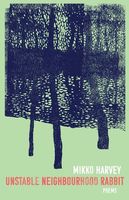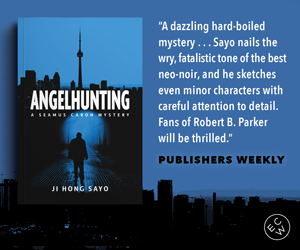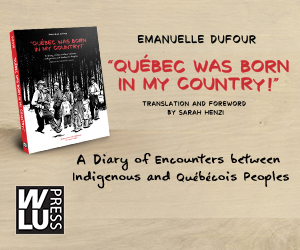Dream Space: an interview with Mikko Harvey
Mikko Harvey is the author of Unstable Neighbourhood Rabbit (House of Anansi, 2018). He received the 2017 RBC/PEN Canada New Voices Award, and he currently lives in New York City, where he is the Joseph F. McCrindle Foundation Online Editorial Fellow at Poets & Writers Magazine.
The first time I read one of Mikko's poems, I felt the same way I felt the first time I heard one of John K. Samson’s songs, or watched Suzannah Showler read: the twin jolts of extreme relief and frantic aspiration that surge through you when you see someone speaking your language, when you need to be friends IRL. When someone seems to see the world this way, the same way you do, you want to know what they think about everything you think about—to check your answers against theirs. To that end, as someone who's recently become obsessed with professional basketball, I was thrilled to goad Mikko into talking about his favourite player.
---
EH: What's your current online obsession, and what do you love about it?
MH: I’m obsessed with D’Angelo Russell, basketball player for the Brooklyn Nets. I watch his games, read think pieces about him on the NetsDaily fan website, keep up with his Instagram, etc. He occasionally appears in my dreams.
My obsession has been going on for a few years now. It began when I was a grad student in poetry at Ohio State, while Russell (also known as “DLo”) was playing for the Ohio State basketball team. He started out as a relatively unknown player, but over the course of the 2015/2016 season he rose to stardom. I enjoyed feeling sneakily near to his evolution—that may have been one of the conditions that allowed my obsession to take hold. I once saw him in the campus art museum, for example. But most of all I just enjoyed watching his unusual and creative playing style. Though not particularly athletic, DLo seemed to see angles and possibilities that other players didn’t. There was something enchanting about his intuitive sense of movement, about his ability to observe and predict the behaviors of multiple moving pieces and—with an admirable (admirable to me at least, though troubling to certain others) casualness—make a decision that seemed to be a step ahead of everyone else’s processing speed. I suspect the reason I love DLo is related to the reason he’ll probably never become a truly great player: his game is driven by aesthetics rather than competitiveness. He doesn’t seem to possess the brutal desire to win that great players must possess. He mostly seems to want to create individual sparks of excitement. It’s a playing style that lends itself to lots of sleek highlight videos, but not a lot of team victories. After his one year at Ohio State, DLo entered the NBA, where he’s had an up-and-down career. There have been flashes of brilliance, of superstar potential, but he’s also been accused of having a bad attitude, of not being a true leader. (He was also at the center of a much-publicized “snitching incident” involving Iggy Azalea, which tarnished his reputation around the league, and felt like a kind of objective correlative indictment of my own character… though it wasn’t quite enough to end my obsession with him.)
One of the few people I have shared my obsession with is the novelist Andrew Battershill. For some extra perspective in answering your question, I asked Andrew what he found intriguing about DLo. Andrew says: “I think it’s the nexus he forms between being crafty and clever and completely clueless. Like, on a micro, beating his man level he’s got so many tricks, but then he makes a huge amount of stupid plays, and shows a very bad grasp of game flow. Also, let’s not lie, we’re obviously physically attracted to him. Not sexually attracted, but physically for sure. That sort of languid grace. And swag, obviously. The swag.”
Andrew is using the “we” here because I have managed to pull him into my obsession. It is good to have friends who understand. And Andrew’s right: for every lovely move DLo makes, he commits an equally lazy, irresponsible mistake—he tries to make the fancy pass instead of the simple one, and it ends up hurting his team; he gambles for steals instead of playing patient defense; he takes heat checks at every possible turn. This nexus of brilliance and foolishness is tantalizing indeed. I keep waiting for DLo to land on one side of the seesaw, but he keeps flipping back and forth, in no great hurry to self-define. Meanwhile, off the court, he continues to be his fashionable, millennial, unknowable-by-me self. He arrives at a press conference carrying a box of Nilla Wafers—is the snack chosen to match the outfit, or is it a coincidence?
Your CanLit News
Subscribe to Open Book’s newsletter to get local book events, literary content, writing tips, and more in your inbox
Why have I yoked part of my own identity to one of the least consistent players in the NBA? The unpredictability is probably the point. DLo’s fluctuations remind me of the swings between self-confidence and self-loathing so characteristic of the writing life. One moment he’s making seven three-pointers in a row against the Raptors, seemingly having caught a jolt of electricity and riding off into the sunset with it. But other times, when he doesn’t find the right jolt, he gets discouraged—and unfortunately, in those moments, he must continue to play basketball on live television against the best players in the world, who proceed to destroy him. Those are the sad times. DLo can look like he’s given up, like he’s playing with a sense of grim obligation, merely going through the motions, his body language suggesting that the game of basketball isn’t even worth his attention. A breaking of the fourth wall that makes me feel dirty for even watching. But maybe, on some level, I like when this happens?
I keep typing but still don’t feel as if I’ve reached the center of my obsession. I wonder how many times I’ve Googled “d’angelo russell.” A thousand? To me DLo is the scout the universe has sent to find out if you can live a life steered by intuition and imagination and still excel in a hard system that asks you to exchange your sense of play for efficient, unending labor. Maybe it’s an arrogant dream: the dream of the world offering you a prized spot based just on your uniqueness. And maybe it’s a self-protective arrogance: the sense that even if you fail, don’t worry, you didn’t fully fail because you didn’t try your hardest. Yes, that’s closer to the center… though by now I am like the English teacher who has gone off the rails, analyzing a poem out of self-service instead of listening to what the poem is actually saying...
I think a hopeful frame can be hung around this: I keep watching DLo because I want to see him succeed. I want him to find the right balance of creativity and discipline, and I want to feel that it’s possible to step into a higher version of yourself, even after repeated failures. A self that doesn’t compromise the features of its own inner landscape, but also doesn’t trip over them so much.
The views expressed in the Writer-in-Residence blogs are those held by the authors and do not necessarily reflect the views of Open Book.


